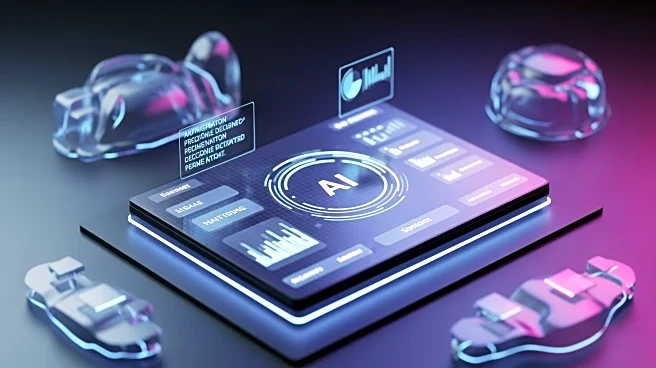What's Happening?
The integration of artificial intelligence (AI) in human resources (HR) is gaining momentum as executives seek ways to leverage AI for improved efficiency and decision-making. The challenge lies in discerning
which AI applications genuinely add value versus those that merely offer impressive demonstrations. HR teams are encouraged to critically evaluate AI features by asking key questions about their utility, security, and compliance. The focus is on identifying AI tools that provide real execution leverage rather than outsourcing strategic decision-making. This approach aims to ensure that AI adoption in HR leads to tangible benefits rather than becoming an expensive distraction.
Why It's Important?
The adoption of AI in HR has significant implications for the industry, potentially transforming how HR departments operate and make decisions. By carefully selecting AI tools that enhance efficiency and provide clear benefits, companies can improve their compensation management, employee retention strategies, and overall HR processes. This shift could lead to more informed decision-making, better resource allocation, and increased productivity. However, the pressure to adopt AI without thorough evaluation could result in wasted resources and ineffective solutions. Therefore, it is crucial for HR leaders to critically assess AI capabilities to ensure they align with organizational goals and provide a real return on investment.
What's Next?
As AI continues to evolve, HR departments are likely to face increasing pressure to integrate AI solutions into their operations. Companies may develop AI-specific security and compliance evaluations to ensure that AI tools meet organizational standards. Additionally, HR leaders will need to stay informed about advancements in AI technology to identify new opportunities for enhancing HR functions. The focus will be on leveraging AI as a strategic partner in decision-making processes, rather than relying on it for tasks that require human judgment and expertise. This approach will help organizations maximize the benefits of AI while minimizing potential risks.
Beyond the Headlines
The ethical implications of AI in HR are an important consideration, as AI tools can impact employee privacy and data security. Organizations must ensure that AI applications comply with legal standards and protect sensitive information. Furthermore, the cultural shift towards AI-driven HR processes may require changes in how employees interact with HR systems and perceive their roles within the company. As AI becomes more integrated into HR functions, companies will need to address these cultural and ethical challenges to maintain trust and transparency with their workforce.









